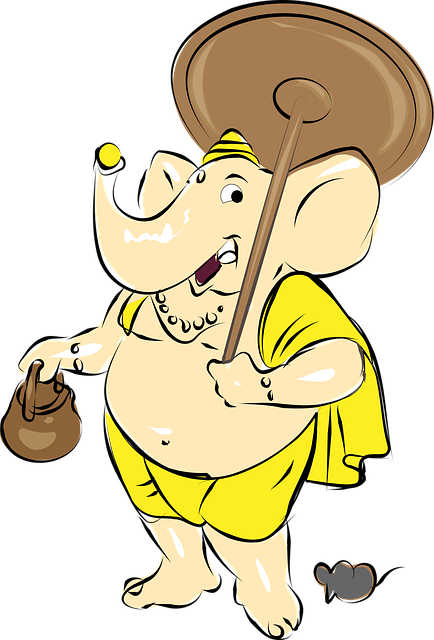
![]()

GANESA is usually regarded as the elder son of Siva and Pārvati All religious ceremonies, all serious compositions in writing and all worldly affairs of importance are begun by pious Hindus with an invocation to Ganesa; a word composed of Isa, the governor or leader, and gana, a company (of deities). But when it comes to birth of Ganesha the Purānas differ very considerably in their accounts of his origin.
Here are few legends in the Purānas regarding birth of Ganesha.
1. According to Matsya Purāna
When Pārvati was bathing, she took the oil and ointments used at the bath, together with the impurities that came from her body, and formed them into the figure of a man, to which she gave life by sprinkling it with the water of the Ganges. This figure had the head of the elephant. The “Siva Purāna” relates that, after giving Ganesa life, Pārvati placed him at her door to prevent intrusion
whilst she was bathing. On his refusal to allow Siva to enter, a struggle ensued, in which that deity cut off Ganesa’s head; but when Pārvati showed her husband that it was by her orders that the door was closed, and wept because of the loss of her son, Siva ordered the first head that could be found to be brought to him; this happened to be an elephant’s, which he fitted to the headless trunk and resuscitated his son.
2. According to Brahmāvaivarta Purāna
Pārvati, after her marriage with Siva, being without a child, and very desirous to obtain one, was advised by her husband to perform the Panyākavrātā. This is the worship of Vishnu, to be begun on the thirteenth day of the bright fortnight of Māgha, and continued for a year, on every day of which flowers, fruits, cakes, vessels, gems, gold, etc., are to be presented, and a thousand Brāhmans fed; and the performer of the rite is to observe most carefully a life of inward purity, and to fix the mind on Hari (Vishnu). Pārvati having, with the aid of Sanat Kumāra, as directing priest, accomplished the ceremony on the banks of the Ganges, returns after some interval, in which she sees Krishna, first as a body of light, and afterwards as an old Brāhman, come to her dwelling. The reward of her religious zeal being delayed, she is plunged in grief, when a viewless voice tells her to go to her apartment, where she will find a son who is the lord of Goloka, or Krishna, that deity having assumed the semblance of her son as a recompense for her devotions.
“In compliment to this occasion, all the gods came to congratulate Siva and Pārvati and were severally admitted to seeing the infant. Amidst the splendid cohort was Sand, the planet Saturn, who, although anxious to pay his homage to the child, kept his eyes stedfastly fixed on the ground. Pārvati asking him the reason of this, he told her that, being immersed in meditation upon Vishnu, he had disregarded the caresses of his wife, and in resentment of his neglect, she had denounced upon him the curse that whomsoever he gazed upon he should
destroy. To obviate the evil consequences of this imprecation, he avoided looking any one in the face. Parvati, having heard his story, paid no regard to it, but, considering that what must be, must be, gave him
permission to look on her son. Sani, calling Dharma to witness his having leave, took a peep at Ganesa, on which the child’s head was severed from his body, and flew away to the heaven of Krishna, where it re-united with the substance of him of whom it formed a part.
“Durgā, taking the headless trunk in her arms, cast herself weeping on the ground, and the gods thought it decent to follow her example, all except Vishnu, who mounted Garuda, and flew off to the river Pushpabhadra, where, finding an elephant asleep, he took off his head, and, flying back with it, clapped it on to the body of Ganesa; hence the body of that deity is crowned with its present uncouth capital. On the restoration of Ganesa to life, valuable gifts were made to the gods and Brāhmans by the parents, and by Pārvati’s father, the personified Himālaya. The unfortunate Sani was again anathematized, and, in consequence of Pārvati’s curse, has limped ever since.
“In another part of the same Purāna, further particulars are given somewhat at variance with the above. Siva, offended with Aditya (the sun), slew him, and although he restored him to life incurred the wrath of the sage Kasyapa, who doomed his (Siva’s) son to lose his head. The elephant whose head was placed upon Ganesa’s body was Indra’s elephant, which was decapitated because Indra threw over his neck the garland of flowers which the sage Durvasas gave him, and the disrespect of which, with the consequent degradation of Indra, is noticed in various Purānas, although with different results. Indra was no loser of an elephant by
this transaction, as Vishnu, moved by the prayers of his wife, gave him another in place of that which he took away.
3. According to Vārāha Purāna
The immortals and holy sages observing that no difficulty occurred in accomplishing good or evil deeds which they and others commenced, consulted together respecting the means by which obstacles might be opposed to the commission of bad actions, and repaired to Siva for counsel, to whom they said: ‘O Mahādeva! God of gods, three-eyed, bearer of the trident, it is thou alone who canst create a being capable of opposing obstacles to the commission of improper acts.’ Hearing these words, Siva looked at Pārvati, and whilst thinking how he could affect the wishes of the gods, from the splendour of his countenance there, sprang into existence a youth shedding radiance around, endowed with the qualities of Siva, and evidently another Rudra, and captivating by his beauty the female inhabitants of heaven.
“Umā seeing his beauty was excited with jealousy, and in her anger pronounced this curse: ‘Thou shalt not offend my sight with the form of a beautiful youth; therefore assume an elephant’s head and a large belly, and thus shall all thy beauties vanish.’ Siva then addressed his son, saying, ‘Thy name shall be Ganesa, and the son of Siva; thou shalt be chief of the Vinayakas and Ganas; success and disappointment shall
spring from thee; and great shall be thine influence amongst the gods, and in sacrifices and all affairs. Therefore shalt thou be worshipped and invoked the first on all occasions, otherwise the object and prayers of him who omits to do so shall fail.

